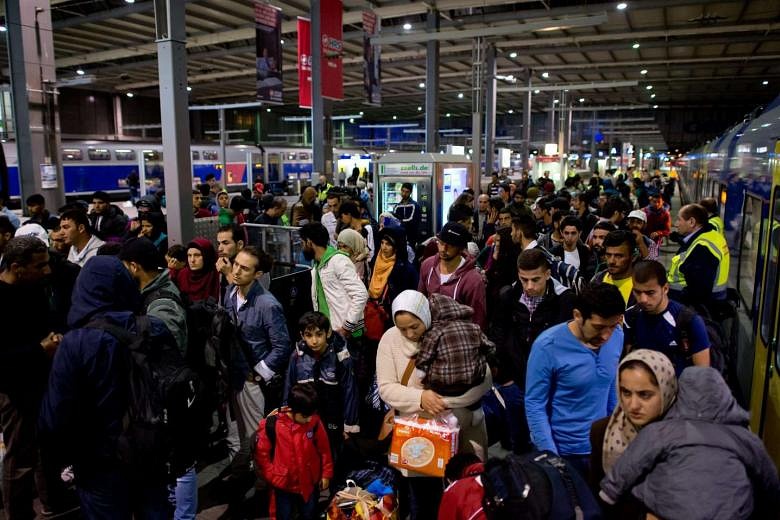MUNICH • The German authorities have warned that they are stretched to capacity to welcome refugees arriving en masse, as Europe scrambled to hold emergency talks on the unprecedented crisis.
Some 13,015 refugees arrived in Munich last Saturday alone, and at least 1,400 were expected to reach the southern German city yesterday - the end of their exhausting and often perilous journey through Hungary and Austria.
Germany has become the destination of choice for many refugees, particularly for Syrians, after Chancellor Angela Merkel decided to relax asylum rules for citizens of the war-torn country.
However, with some 450,000 people arriving in Europe's biggest economy so far this year, the local authorities are buckling under the sudden surge.
"Given the numbers from yesterday, it is very clear that we have reached the upper limit of our capacity," said a Munich police spokesman yesterday.
By yesterday, order had largely returned to the city's main railway station .
Munich Mayor Dieter Reiter vowed he would not give up in the face of the daunting challenge, but made a plea yesterday to give his city a chance to catch its breath.
"The night was long. We managed, but we need a regulated, sustainable system to distribute the arriving refugees across Germany," he said, a day after the over 13,000 refugees poured in.
The president of the Upper Bavaria region, Mr Christoph Hillenbrand, said he did not know "how we can cope", according to the Bild am Sonntag tabloid, whose headline for the article was "Munich on the brink of collapse".
In a sign that the authorities were running out of options, regular passenger trains will be cleared out to transport refugees. Up till now, special services had been used for this purpose.
The aim is to rapidly send refugees onwards to other German cities to free up space for new arrivals.
The authorities are also mulling over whether to open up the Olympiahalle - a stadium used for the 1972 Olympics - as a temporary shelter for the refugees.
Federal Transport Minister Alexander Dobrindt said in a statement: "Effective measures are necessary now to stop the influx.
"That includes help for countries from where refugees are fleeing and also includes an effective control of our own borders, which also no longer work, given the EU's (European Union's) complete failure to protect its external borders."
Mr Dobrindt was essentially referring to the border between Turkey and Greece, which many migrants have crossed.
Dr Merkel herself had last Saturday called on Athens to make more of an effort to protect the EU's external borders.
Interior Minister Thomas de Maiziere said refugees streaming into Europe should not be able to choose where to settle.
In an interview with German newspaper Der Tagesspiegel, Mr de Maiziere said refugees given protection in Europe should accept that they will be distributed across the bloc.
Interior ministers from the EU's 28 member states are holding emergency talks in Brussels today to discuss proposals from the EU's executive commission to redistribute about 160,000 asylum seekers across the bloc.
As the continent scrambles to respond to the biggest movement of people since World War II, sharp divisions have emerged among the EU member states.
While Germany and France back proposals to help "frontline" states Italy, Greece and Hungary, which are buckling under the strain, European Commission proposals for sharing the new arrivals in a quota scheme are facing resistance from eastern members.
Hungary, which reported a new record in migrant arrivals - 4,330 last Saturday - was working around the clock to finish a controversial anti-migrant fence along its border with Serbia.
Yesterday, at least 28 people, including a child, drowned when a boat carrying about 100 migrants capsized off Greece.
The Organisation of Islamic Cooperation was also due to hold an emergency meeting on the crisis yesterday.
While Jordan, Lebanon and Turkey are housing millions of refugees from Syria, many wealthy Gulf states are facing increasing scrutiny over their apparent reluctance to take in people fleeing the conflict.
AGENCE FRANCE-PRESSE, REUTERS

